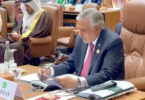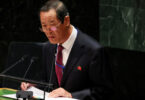F.P. Report
KARACHI: Adviser to Prime Minister on Finance Abdul Hafeez Sheikh on Thursday said that Pakistan Tehreek-e-Insaf (PTI) has taken difficult decisions to improve country’s economy.
Addressing a press conference in Karachi along with Sindh Governor Imran Ismail, he said that Pakistan is facing difficult economic conditions as the country’s Foreign Exchange Reserves have declined by US$10 billion.
The adviser said that the PTI government has taken difficult decisions to improve economy, adding that following an agreements with the International Monetary Fund (IMF), Pakistan will get loans from World Bank and Asia Development Bank (ADB) on lower interest rates.
Sheikh went on to say that Pakistan and IMF have reached an agreement of $6 billion for a period of three years, while World Bank and ADB are also expected to give US$2 to US$3 billion worth loans.
He said: “Country’s total debt was around Rs31,000 billion when PTI government came into power, adding that the foreign exchange reserves had depleted, while deficit increased.”
Pakistan’s economic condition was not good when PTI government came into power, adding that power tariff increase won’t affect those consuming 300 units. “We have taken traders in confidence,” he said and added relief in budget for common man is government’s priority.
He said the measures will help increase tax revenue while finance and monitoring departments will also see some improvement.
The finance advisor informed that the government would allocate around 800 billion rupees for the development programs in the next budget while allocation for social security program will be increased to 180 billion rupees which is 100 billion rupees at the moment.
Pak, IMF reach agreement
On Sunday, Pakistan had reached an accord with the International Monetary Fund for a three-year, $6 billion bailout package aimed at shoring up fragile public finances and strengthening a slowing economy. The deal, which still needs approval by the IMF board in Washington, would be the 13th such bailout since the late 1980s.
“Pakistan is facing a challenging economic environment, with lacklustre growth, elevated inflation, high indebtedness, and a weak external position,” the IMF said in a statement outlining the framework deal.
The IMF forecasts Pakistan’s economic growth slowing to 2.9% this fiscal year from 5.2% in 2018, while the central bank has cut its estimate to between 3.5-4%.
As the bailout talks neared culmination, Khan shook up his top economic team, replacing Asad Umar with Hafeez Shaikh as finance minister and making IMF economist Reza Baqir central bank governor instead of Tariq Bajwa.
Advisor to Prime Minister on Finance Abdul Hafeez Sheikh said Pakistan will get six billion dollars in three years, while an additional amount of two to three billion dollars may likely come from World Bank and Asian Development Bank on less interest rate.
Dr Abdul Hafeez Shaikh said the IMF programme will be implemented after its formal approval from fund’s board. He said the agreement will improve debt situation and sent a positive signal to the world to attract foreign investment.
The Advisor said that the IMF programme will provide an opportunity to bring structural changes to handle issues pertaining to loss making state owned enterprises, exports, and to enhance revenue.
Details of the agreement
Under the agreement, Pakistan will receive about US$6 billion for a period of 39 months .
Below are details of the agreement provided on the IMF’s website.
The Extended Fund Facility arrangement aims to support the authorities’ strategy for stronger and more inclusive growth by reducing domestic and external imbalances, removing impediments to growth, increasing transparency, and strengthening social spending.
An ambitious structural reform agenda will supplement economic policies to rekindle economic growth and improve living standards.
Financing support from Pakistan’s international partners will be critical to support the authorities’ adjustment efforts and ensure that the medium-term program objectives can be achieved.
In response to a request by the Pakistani authorities, an International Monetary Fund (IMF) mission led by Mr. Ernesto Ramirez Rigo visited Islamabad, Pakistan from April 29 to May 11 to discuss IMF support for the authorities’ economic reform program. At the end of the visit, Mr. Ramirez Rigo made the following statement:
“The Pakistani authorities and the IMF team have reached a staff level agreement on economic policies that could be supported by a 39-month Extended Fund Arrangement (EFF) for about US$6 billion. This agreement is subject to IMF management approval and to approval by the Executive Board, subject to the timely implementation of prior actions and confirmation of international partners’ financial commitments. The program aims to support the authorities’ strategy for stronger and more balanced growth by reducing domestic and external imbalances, improving the business environment, strengthening institutions, increasing transparency, and protecting social spending.
“Pakistan is facing a challenging economic environment, with lackluster growth, elevated inflation, high indebtedness, and a weak external position. This reflects the legacy of uneven and procyclical economic policies in recent years aiming to boost growth, but at the expense of rising vulnerabilities and lingering structural and institutional weaknesses. The authorities recognize the need to address these challenges, as well as to tackle the large informality in the economy, the low spending in human capital, and poverty. In this regard, the government has already initiated a difficult, but necessary, adjustment to stabilize the economy, including thorough support from the State Bank of Pakistan. These efforts need to be strengthened. Decisive policies and reforms, together with significant external financing are necessary to reduce vulnerabilities faster, increase confidence, and put the economy back on a sustainable growth path, with stronger private sector activity and job creation.
“The EFF aims to support the authorities’ ambitious macroeconomic and structural reform agenda during the next three years. This includes improving public finances and reducing public debt through tax policy and administrative reforms to strengthen revenue mobilization and ensure a more equal and transparent distribution of the tax burden. At the same time, a comprehensive plan for cost-recovery in the energy sectors and state-owned enterprises will help eliminate or reduce the quasi-fiscal deficit that drains scarce government resources. These efforts will create fiscal space for a substantial increase in social spending to strengthen social protection as well as in infrastructure and human capital development. The modernization of the public finance management framework will increase transparency and spending efficiency. Provinces are committed to contribute to these efforts by better aligning their fiscal objectives with those of the federal government.
“The forthcoming budget for FY2019/20 is a first critical step in the authorities’ fiscal strategy. The budget will aim for a primary deficit of 0.6 percent of GDP supported by tax policy revenue mobilization measures to eliminate exemptions, curtail special treatments, and improve tax administration. This will be accompanied by prudent spending growth aimed at preserving essential development spending, scaling up the Benazir Income Support Program and improve targeted subsidies, with the goal of protecting the most vulnerable segments of society.
“The State Bank of Pakistan will focus on reducing inflation, which disproportionately affects the poor, and safeguarding financial stability. A market-determined exchange rate will help the functioning of the financial sector and contribute to a better resource allocation in the economy. The authorities are committed to strengthening the State Bank of Pakistan’s operational independence and mandate.
“An ambitious structural reform agenda will supplement economic policies to rekindle economic growth and improve living standards. Priority areas include improving the management of public enterprises, strengthening institutions and governance, continuing anti-money laundering and combating the financing of terrorism efforts, creating a more favorable business environment, and facilitating trade. To improve fiscal management the authorities will engage provincial governments on exploring options to rebalance current arrangements in the context of the forthcoming National Financial Commission.
“The IMF team is grateful to the Pakistani authorities for open and constructive discussions and their hospitality.”
Finance Minister Abdul Hafeez Shaikh said he hoped it would be Pakistan’s last.
Prime Minister Imran Khan’s government came to power last year determined to avoid another bailout and initially sought billions of dollars in funding from friendly countries including China, Saudi Arabia and the United Arab Emirates.
But with inflation climbing to over 8 percent, the rupee losing a third of its value over the past year, and foreign exchange reserves barely enough to cover two months of exports, it was forced to turn to the IMF.






